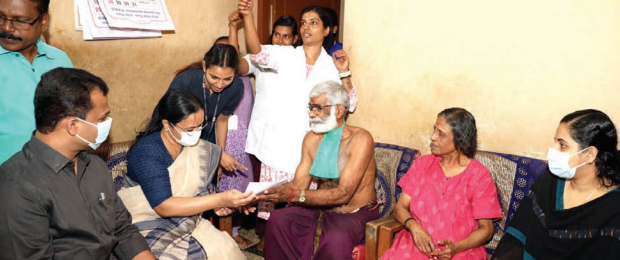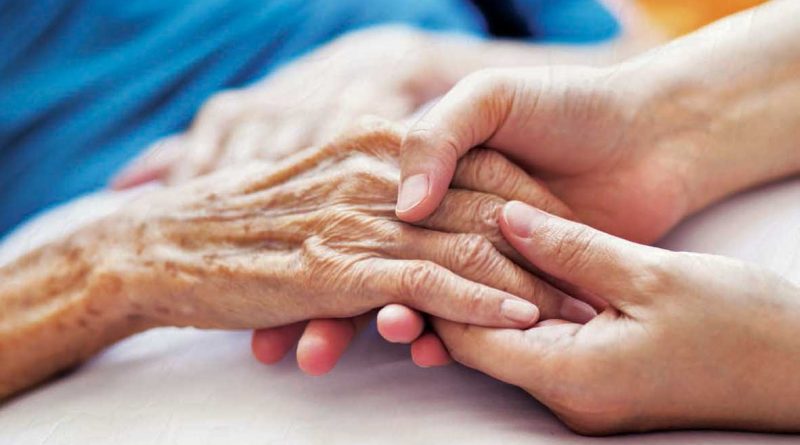Kerala’s Pioneering Palliative Care: A Model for the World

The World Health Organization (WHO) defines palliative care as an approach to enhance the quality of life for patients and families facing life-threatening illnesses, focusing on preventing and relieving suffering through early identification, assessment, and treatment of pain and other issues. Despite its importance, palliative care remains insufficient globally, with 45% of all deaths in 2015 involving serious health-related suffering, highlighting the need for better services, especially in developing countries, as emphasised by the Sustainable Development Goals (SDGs) and the Astana Declaration (2018).
The Genesis of Palliative Care in Kerala
Kerala’s journey into palliative care began in the early 1990s with the efforts of dedicated non-profit organizations led by doctors. The movement gained significant momentum in 2000 with the inception of the Neighbourhood Network in Palliative Care (NNPC) in Malappuram. This initiative mobilised local communities to provide home-based care for chronically ill and dying patients, emphasising community participation and volunteerism.By 2007, the NNPC model had spread across 100 panchayats in Malappuram, resulting in the formation of 300 palliative care units. This grassroots success captured the state government’s attention, leading to the
formulation of Kerala’s first Palliative Care Policy in 2008. This policy mandated the inclusion of palliative care projects in local government plans, and by 2012, 90% of local bodies had adopted this initiative. In 2008, Kerala formulated its first Palliative Care Policy, emphasising home-centric care based on the experiences gathered over the years.
This was mostly done on the basis of the experience of the palliative care workers in the previous years. The decade long process of the policy has strengthened the palliative care in Kerala and made it a significant element in the patient care.
The Comprehensive Palliative Care Policy of 2019
Building on its initial success, Kerala revised its Palliative Care Policy in 2019 to further strengthen and expand its palliative care services. The policy aims to provide high-quality, accessible palliative care to all in need, grounded in several key principles:
Rights-Based Approach: Treating palliative care as a fundamental human right.
Universality: Ensuring that no one is left behind, especially the poorest and most vulnerable.
Integration: Embedding palliative care within all medical disciplines and healthcare systems.
Multi-Sectoral Approach: Involving various departments and stakeholders to provide comprehensive care.
Community-Based Care: Empowering local communities to actively participate in care delivery.
The policy outlines specific roles for primary, secondary, and tertiary
levels of care. At the primary level, community health workers and volunteers provide home-based care. Secondary care involves Community Health Centres (CHCs) with dedicated palliative care beds and services, while tertiary care includes specialised divisions in medical colleges and district hospitals.
 Training, Capacity Building, and Community Involvement
Training, Capacity Building, and Community Involvement
Training and capacity building are critical components of Kerala’s palliative care policy. Mandatory training for healthcare personnel, sensitisation programmes for students, and partnerships with NGOs and community-based organizations (CBOs) ensure that all stakeholders are equipped to deliver quality care. The policy also emphasises the importance of documentation and research to continuously improve palliative care services. Kerala’s model places strong emphasis on community participation and volunteerism. Local self-government bodies and volunteers play a crucial role in providing care under the supervision of the primary health system. This community-based approach ensures that quality palliative home care is accessible to everyone in need
Special Focus on Vulnerable Populations
Kerala’s palliative care policy pays special attention to vulnerable groups, including children, people in geographically inaccessible areas, and individuals living with HIV/AIDS. The policy ensures these groups receive tailored palliative care services. Additionally, efforts are made to support the socio-economic rehabilitation of patients, providing them with skills and opportunities for livelihoods.
Integration of Traditional and Modern Care
Kerala’s holistic approach integrates systematic palliative care activities within the AYUSH sector, blending traditional and alternative medicine with modern palliative care practices. This enhances the quality of care provided to patients
Education and Training Initiatives
Kerala has developed a unified curriculum for palliative care courses and launched a Diploma in Domiciliary Nursing course. Palliative training centres in all districts ensure a steady supply of skilled professionals dedicated to providing compassionate care
Recognition and Impact
Kerala’s innovative and compassionate approach has earned recognition from the WHO and has positioned the state as a leader in palliative care. The state’s dedication to ensuring quality palliative care through comprehensive planning, education, and community involvement serves as a model for regions worldwide, showcasing the profound impact of a well-structured palliative care system.


